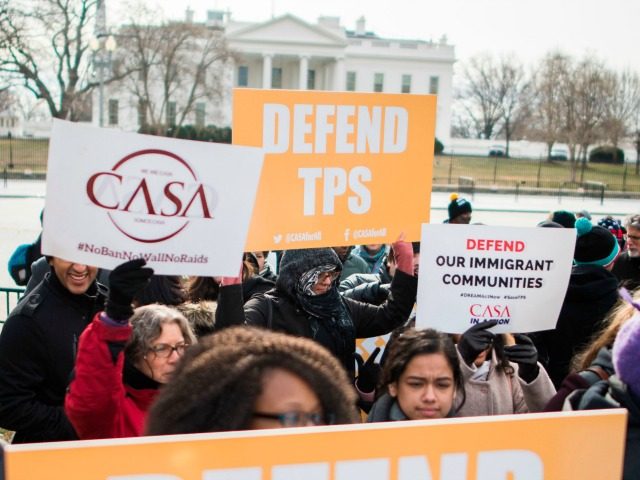President Donald Trump is quietly sending a small population of Liberians back home after 20-plus years of temporary residency in the United States.
On Tuesday, Trump ended the so-called “Deferred Enforced Departure” status of a small population of Liberians who were allowed to stay in the United States for more than a decade after the expiration of their “Temporary Protected Status” in 2007.
The policy likely means that roughly 1,000 Liberians will be sent home because many of the original group of Liberians have managed to get green cards and residency in the decades since their arrival. According to Politico, only 840 resident Liberians get work permits via the expiring program.
The policy is part of Trump’s clean-up of various tangled programs for migrants and refugees. Since 2017, he has ended supposedly temporary residency programs for roughly 325,000 foreigners who have been living in the United Stimes, sometimes for more than two decades. Their gradual departure will shrink the nation’s economy by a very small amount, but will also open up more than 100,000 jobs for disadvantaged Americans.
Nearly 1M people were out of the workforce because of opioid addiction in 2015, according to study https://t.co/gYM8EM3dwr Mass immigration not only does nothing to *fix* this — it makes it easier to ignore.
— Mark Krikorian (@MarkSKrikorian) March 28, 2018
The Liberians got TPS status in 1991 to help them stay out of the African country’s civil war. The war gradually ended, so the TPS status was ended in 2007. But former President George W. Bush offered the Liberians the DED status, and former President Barack Obama extended their DED status twice during his eight-year term.
Some of the homeward-bound Liberians are now objecting to their long-delayed departure, due by March 31, 2019. ABC News reported:
“This is home for me, and the thought of leaving my daughter is emotional. I’m pleading with the President and Congress to extend DED,” one recipient, Nancy Harris of Alabama — who’s been in the U.S. for 18 years with her husband, a pastor — told reporters Monday.
One Liberian beneficiary told ABC News that President Trump’s decision is “unacceptable”:
“To see that Liberians in the United States have stabilized their lives — and I think that’s part of the American Dream and the pursuit of happiness — and still uproot us and send us back to Liberia will force us to become refugees all over again,” said Caroline Grimes, a DED recipient in Minnesota. “We must let Donald Trump know that this decision is unacceptable.”
Open-border Democrats also objected to foreigners being asked to leave the United States. “To ask people who have been here since the late 1990’s to leave is harsh, cruel, and disgusting,” Patrice Lawrence, policy director of UndocuBlack Network, told ABC News. “We see this administration’s relentless anti-immigrant policy and rhetoric as a concerted effort to make every immigrant undocumented.”
Frank Sharry, founder of the pro-migration America’s Voice group, declared:
With termination of Liberian DED, Trump continues to feed the mass deportation beast.Let’s be clear. Trump and his sidekick, DHS Secretary Nielsen, are intent on driving millions of immigrants out of the country. When it comes to putting immigrants on a path to deportation, it doesn’t seem to matter how long they’ve been here, the conditions they fled in the first place, the contributions they have made or the impact on their families, employers and communities, or the fact that they’ve had legal status for years and years. The bottom line seems to be this: get ready to get out; this is especially true if you are from what the President calls “shithole countries.”
Liberians’ groups in the United States are working with progressive groups and cheap-labor business groups to extend their stay.
Trump’s decision to end the Liberian DED status comes after he and his deputies have announced they are gradually ending TPS status for roughly 260,000 people from El Salvador, 58,000 Haitians, 5,000 Nicaraguans, 1000 Sudanese. Also, 86,000 people from Honduras will learn in May whether their multi-year TPS status will be extended.
The departure of the various TPS migrants will open up many jobs for lower-skilled Americans, so helping raise wages after decades of little or no growth.

COMMENTS
Please let us know if you're having issues with commenting.